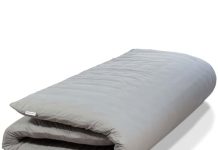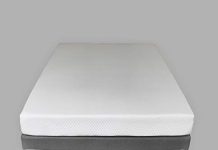Have you ever wondered why people are opting for floor mattresses these days? Well, we’re here to shed some light on this increasingly popular bedding trend. A floor mattress, also known as a Japanese futon or a tatami mattress, is a low-profile sleeping surface that sits directly on the floor. Providing a simplistic and minimalist approach to bedding, floor mattresses offer comfort, flexibility, and a unique sleeping experience. In this article, we will explore the benefits, features, and considerations of using a floor mattress, helping you decide if this alternative sleeping arrangement is right for you. So, let’s dive into the world of floor mattresses! A floor mattress is exactly what it sounds like – a mattress that is placed directly on the floor instead of on a traditional bed frame or box spring. It is a simple and minimalist sleeping solution that offers a unique alternative to a regular mattress. Many people opt for floor mattresses for various reasons, including space-saving, versatility, and affordability. In this article, we will delve into the definition of a floor mattress, explore the difference between a floor mattress and a regular mattress, discuss the advantages and disadvantages of using a floor mattress, explore the different types available, highlight important factors to consider when choosing a floor mattress, provide tips on properly maintaining it, and offer insights on where to purchase one.
Review contents
Definition of a Floor Mattress
A floor mattress is a low-profile sleeping surface that is designed to be placed directly on the floor. It typically consists of a foam or spring core that is encased in a fabric cover. Unlike a regular mattress, which is elevated off the ground by a bed frame or box spring, a floor mattress lies directly on the floor. This minimalistic approach to sleeping has gained popularity in recent years as people seek alternative sleeping arrangements and embrace the concept of floor living.
When it comes to design features, floor mattresses are often simpler and more streamlined compared to regular mattresses. They forgo the typical layers of padding and cushioning found in traditional mattresses, resulting in a thinner and firmer sleeping surface. However, they may still incorporate additional layers or materials to enhance comfort and support.
Floor mattresses come in various sizes, ranging from twin to king, allowing individuals or couples to find the perfect fit for their sleeping needs. Additionally, they are available in different thickness options, with some being as thin as a few inches, while others may offer more substantial padding. The choice of thickness depends on personal preference and desired level of comfort.
Difference Between a Floor Mattress and a Regular Mattress
The primary difference between a floor mattress and a regular mattress lies in their height and structure. A regular mattress, when used with a bed frame or box spring, is elevated off the ground, providing a more traditional sleeping experience. In contrast, a floor mattress sits directly on the floor, resulting in a lower sleeping surface.
Support and comfort are also distinguishing factors. Regular mattresses are designed to provide a balance of support and cushioning, with various layers and materials working together to cradle the body and relieve pressure points. Floor mattresses, on the other hand, tend to offer a firmer sleeping surface with less padding. While this may suit some individuals who prefer a firm mattress, others may find it less comfortable, especially if they require extra cushioning.
Portability and storage are additional factors that set floor mattresses apart from regular mattresses. A floor mattress can be easily rolled up or folded, making it highly portable and convenient for individuals who frequently move or travel. Additionally, floor mattresses take up minimal space when not in use, allowing for easy storage in closets or under beds. In contrast, regular mattresses are bulkier and less flexible, often requiring more effort and space to transport and store.
Advantages of Using a Floor Mattress
Using a floor mattress offers several advantages that make it an appealing option for many individuals.
One of the key advantages of a floor mattress is its space-saving nature. By eliminating the need for a bed frame or box spring, a floor mattress allows you to maximize your living space. This is particularly beneficial in smaller apartments or rooms where every inch counts. With a floor mattress, you have more flexibility in arranging furniture and utilizing the available area.
Another advantage is the versatility that a floor mattress provides. Without the constraints of a bed frame, you can easily move the mattress to different locations within your home. This means you can transform your living room into a cozy sleeping area for guests or create a comfortable lounging spot for movie nights. The versatility of a floor mattress allows you to adapt your living space to your needs and preferences.
Affordability is yet another appealing aspect of using a floor mattress. Compared to the cost of purchasing a traditional bed frame, box spring, and mattress set, a floor mattress is often a more budget-friendly option. This makes it an attractive choice for those on a tight budget or individuals who prefer to spend their money on other priorities.
Setting up and maintaining a floor mattress is generally hassle-free. With no bed frame or box spring to assemble, the setup process is straightforward and requires minimal effort. Additionally, floor mattresses are relatively easy to clean as they can be vacuumed or spot cleaned as needed. This simplicity in both setup and maintenance adds to the convenience of using a floor mattress.
Furthermore, a floor mattress can accommodate various sleeping positions, making it suitable for individuals with different preferences. Whether you prefer sleeping on your back, side, or stomach, a floor mattress can provide the necessary support. Its firmness level can also be customized by adding a mattress topper if desired, allowing you to find the perfect balance of comfort and support.
Disadvantages of Using a Floor Mattress
While floor mattresses offer several advantages, it is important to consider the potential disadvantages before making a decision.
One significant drawback of a floor mattress is its lack of height and cushioning. Without the elevation provided by a bed frame or box spring, floor mattresses can feel low to the ground, especially for individuals accustomed to sleeping on a raised surface. This can make getting in and out of bed more difficult, particularly for people with mobility issues. Additionally, the limited cushioning of a floor mattress may not provide enough softness and comfort for those who prefer a more plush sleeping surface.
Another potential disadvantage is the reduced insulation and protection offered by a floor mattress. Elevating the sleeping surface off the ground helps to insulate against cold drafts and offers protection from dust and pests. When using a floor mattress, there may be less insulation from the floor, which can result in a colder sleeping experience, especially during winter months. Additionally, floor mattresses are more susceptible to dust and moisture that may accumulate on the floor, requiring regular cleaning to ensure a clean and hygienic sleeping environment.
Durability is another aspect to consider. Floor mattresses, especially those with thinner profiles, may have a shorter lifespan compared to regular mattresses. The absence of a box spring or bed frame means that the mattress is more exposed to wear and tear from direct contact with the floor. Over time, this constant contact can lead to compression and sagging, reducing the overall durability and support of the mattress.
Furthermore, air circulation can be limited when using a floor mattress. Traditional mattresses are often designed with ventilation channels or airflow-enhancing materials to promote breathability and prevent the buildup of heat and moisture. Floor mattresses, lacking the structure of a regular mattress, may not offer the same level of air circulation. This can result in an uncomfortably warm or humid sleeping environment, particularly for individuals who tend to sleep hot.
Types of Floor Mattresses
There are several types of floor mattresses available, each offering its own unique features and benefits. Here are three common types:
-
Japanese Futon: A Japanese futon is a traditional type of floor mattress that originated in Japan. It consists of a thin cotton-filled mattress that is placed directly on the floor. Futons are known for their simplicity and versatility, as they can be easily rolled up and stored during the day to create additional living space. While they may lack the plushness of typical mattresses, they offer a firm sleeping surface that some individuals find comfortable and supportive.
-
Rolling Floor Mattress: A rolling floor mattress is a modern variation of a floor mattress that combines comfort and portability. It is typically made of foam or memory foam and can be rolled up for easy storage or transportation. Rolling floor mattresses often come with a removable cover that can be washed, adding to their convenience and hygiene. These mattresses are available in various thickness options, allowing individuals to choose the level of comfort and support that suits their preferences.
-
Foam-based Floor Mattress: Foam-based floor mattresses are similar to rolling floor mattresses in that they are made of foam or memory foam. However, unlike rolling floor mattresses, foam-based floor mattresses do not roll up for storage. Instead, they are designed to be used as a permanent or semi-permanent sleeping solution. These mattresses offer a balance of support and cushioning, providing a comfortable sleeping surface that conforms to the body’s contours.
Factors to Consider When Choosing a Floor Mattress
When selecting a floor mattress, there are several important factors to consider to ensure that you find the most suitable option for your needs:
-
Comfort Level: Comfort is subjective and varies from person to person. Consider whether you prefer a softer or firmer sleeping surface and choose a floor mattress that aligns with your comfort preferences.
-
Material Quality: The quality of materials used in a floor mattress can greatly impact its overall durability and performance. Look for mattresses made of high-quality foams or springs that are designed to withstand regular use.
-
Thickness and Density: Consider your desired level of comfort and support when choosing the thickness and density of a floor mattress. Thicker mattresses with higher density foam or springs tend to offer more cushioning and support.
-
Sleeping Preferences: Take into account your preferred sleeping positions, as some floor mattresses may be better suited for certain sleeping positions. For example, side sleepers may require more contouring and pressure relief, while back sleepers may prioritize spinal alignment and support.
-
Size and Dimensions: Determine the appropriate size of the floor mattress based on your sleeping arrangements and available space. Measure the area where the mattress will be placed to ensure a proper fit.
How to Properly Maintain a Floor Mattress
Proper maintenance of a floor mattress is essential for ensuring its longevity and keeping it clean. Here are some maintenance tips to follow:
Regular Cleaning: Vacuum the floor mattress regularly to remove dust, dirt, and allergens. Spot clean any spills or stains with a mild detergent and warm water. Allow the mattress to air dry completely before using it again.
Proper Storage: If you need to store the floor mattress temporarily, ensure it is completely dry to prevent the growth of mold or mildew. Store it in a cool, dry location away from direct sunlight to protect the materials from deteriorating.
Rotation and Flipping: To minimize uneven wear and maintain the mattress’s shape, rotate it periodically. If the mattress is double-sided, consider flipping it as well.
Protective Covers: Consider using a mattress protector or cover to shield the floor mattress from spills, stains, and allergens. These covers can be easily removed and washed, helping to maintain a clean and hygienic sleeping surface.
Where to Purchase a Floor Mattress
There are several options available for purchasing a floor mattress, depending on your preferences:
Physical Mattress Stores: Visit local mattress stores or department stores that specialize in bedding to explore different floor mattress options in person. This allows you to test the mattresses and speak with knowledgeable sales representatives who can provide valuable insights and recommendations.
Online Retailers: Online retailers offer a wide range of floor mattresses, providing convenience and the ability to compare various options and customer reviews. Many online mattress companies offer hassle-free delivery and return policies, making it easier to find the perfect floor mattress from the comfort of your home.
Specialty Bedding Stores: Specialty bedding stores often carry floor mattresses in addition to regular mattresses. These stores focus on unique sleeping solutions and may have a dedicated section for floor mattresses, allowing you to browse a curated selection.
Cost of a Floor Mattress
The cost of a floor mattress can vary greatly depending on factors such as size, materials used, and brand. Generally, floor mattresses tend to be more affordable compared to traditional mattresses. Budget-friendly options can start as low as $100, while higher-end floor mattresses made with premium materials can cost several hundred dollars or more. It is important to consider your budget and desired features when choosing a floor mattress.
Conclusion
In conclusion, a floor mattress offers a simple, space-saving, and versatile sleeping solution. Whether you live in a small apartment, frequently move, or simply appreciate the minimalistic aesthetic, a floor mattress can be a suitable choice. It is important to weigh the advantages and disadvantages, consider the different types available, evaluate important factors when choosing, and properly maintain the mattress to maximize its lifespan. With the wide range of options and availability through physical stores and online retailers, finding the perfect floor mattress to meet your needs and preferences has never been easier.



























